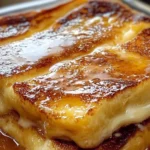Overnight Crème Brûlée French Toast: A Breakfast Dream Come True
Imagine waking up to the aroma of warm, caramelized sugar and the promise of a truly indulgent breakfast. This Overnight Crème Brûlée French Toast is a dream come true – crispy, caramelized edges, a custardy center, and all the deliciousness is prepped the night before! It’s the perfect treat for holidays, brunch, or any day you deserve a little something special. This easy recipe is ideal for beginner cooks, requiring minimal effort and delivering maximum flavor.
- Prep Time: 15 minutes
- Cook Time: 40 minutes
- Total Time: 55 minutes (plus overnight chilling)
- Yield: 8 servings 1x
- Category: Breakfast, Brunch, Dessert, Holiday Breakfast, Special Occasion
- Method: Baking, Stovetop
- Cuisine: American, French-Inspired
Ingredients
- Caramel:
- ½ cup unsalted butter
- 1 cup brown sugar
- 2 tbsp maple syrup
- French Toast:
- 1 loaf brioche or challah bread, sliced
- 5 large eggs
- 1 ½ cups half-and-half
- 1 tsp vanilla extract
- Pinch of salt
Instructions
-
Make the Caramel: The Sweet Start: In a medium saucepan over medium heat, melt the butter, brown sugar, and maple syrup, stirring constantly until smooth and slightly thickened (about 3–4 minutes). The mixture will bubble and darken slightly as it cooks. Pro Tip: Keep a close eye on the caramel as it cooks. You want it to be a rich amber color, but you don’t want it to burn. Burnt caramel will taste bitter. Continue stirring to prevent scorching. You’re looking for a smooth, glossy consistency.
-
Prepare the Baking Dish: The Caramel Canvas: Pour the caramel mixture into the bottom of a greased 9×13-inch baking dish, spreading it out evenly. Pro Tip: Greasing the dish with cooking spray or a little bit of butter will make it much easier to remove the French toast after it’s baked and prevent the caramel from sticking.
-
Arrange the Bread: The Custard Catchers: Arrange the bread slices in a single layer over the caramel mixture in the baking dish. Pro Tip: You may need to trim the bread slices slightly to fit snugly in the dish, especially if your bread is larger than the dish. Try to arrange them in a way that minimizes gaps, allowing the custard to soak evenly. Overlapping the bread slightly is fine.
-
Whisk the Custard: The Creamy Dream: In a mixing bowl, whisk together the eggs, half-and-half, vanilla extract, and salt until well combined. You want the mixture to be smooth and slightly frothy. Pro Tip: Whisking the custard thoroughly will ensure that it’s smooth and evenly distributed, preventing any eggy clumps in your French toast.
-
Soak the Bread: The Custard Infusion: Pour the custard mixture evenly over the bread slices, making sure that every slice is thoroughly coated. Press the bread gently with your hands or a spatula to help it soak up the custard. This step is absolutely crucial for achieving that signature custardy center. Pro Tip: You want the bread to be well-soaked but not completely saturated and mushy. It should feel soft and plump, but not falling apart.
-
Refrigerate Overnight: The Flavor Magic: Cover the dish tightly with plastic wrap or aluminum foil and refrigerate overnight, or at least for 6–8 hours. This extended soaking time allows the bread to fully absorb the custard, infusing it with flavor and creating that melt-in-your-mouth texture. It also allows the caramel to set and become slightly firmer. Pro Tip: This is the beauty of this recipe – you do all the prep work the night before, so all you have to do in the morning is bake it! It’s perfect for busy mornings or when you’re entertaining.
-
Bake the French Toast: The Grand Finale: The next morning, preheat your oven to 350°F (175°C). Let the dish sit at room temperature for 10–15 minutes while the oven heats. This will help the French toast bake more evenly and prevent it from cracking.
-
Bake to Perfection: The Golden Touch: Remove the plastic wrap or foil and bake the French toast for 35–45 minutes, or until the top is golden brown, the caramel is bubbling around the edges, and the custard is set. Pro Tip: Keep a close eye on the French toast as it bakes. The baking time may vary slightly depending on your oven and the thickness of your bread. You’re looking for a beautiful golden brown color and a set custard. The center should be slightly soft but not jiggly.
-
Rest and Serve: The Sweet Reward: Allow the French toast to rest for 5 minutes before serving warm, with any extra caramel sauce drizzled over the top. This will allow the French toast to firm up slightly, making it much easier to slice and serve without it falling apart. The resting time also allows the caramel to cool slightly, making it less likely to burn your mouth.
Notes
- Troubleshooting: Kitchen Calamities Conquered: If your French toast is browning too quickly on top but the center is still soft, you can tent it loosely with aluminum foil during the last part of the baking time. This will prevent the top from burning while the center continues to cook. If the center seems too eggy or not set, continue baking it for a little longer, checking it every few minutes until it reaches the desired consistency.
- Prep Efficiency: Time-Saving Strategies: You can whisk the custard mixture ahead of time and store it in the refrigerator in an airtight container for up to 24 hours. You can also make the caramel sauce ahead of time and store it in the refrigerator (reheat it gently over low heat before pouring it into the baking dish). These make-ahead steps will save you valuable time in the morning, especially if you’re preparing this for a crowd.
